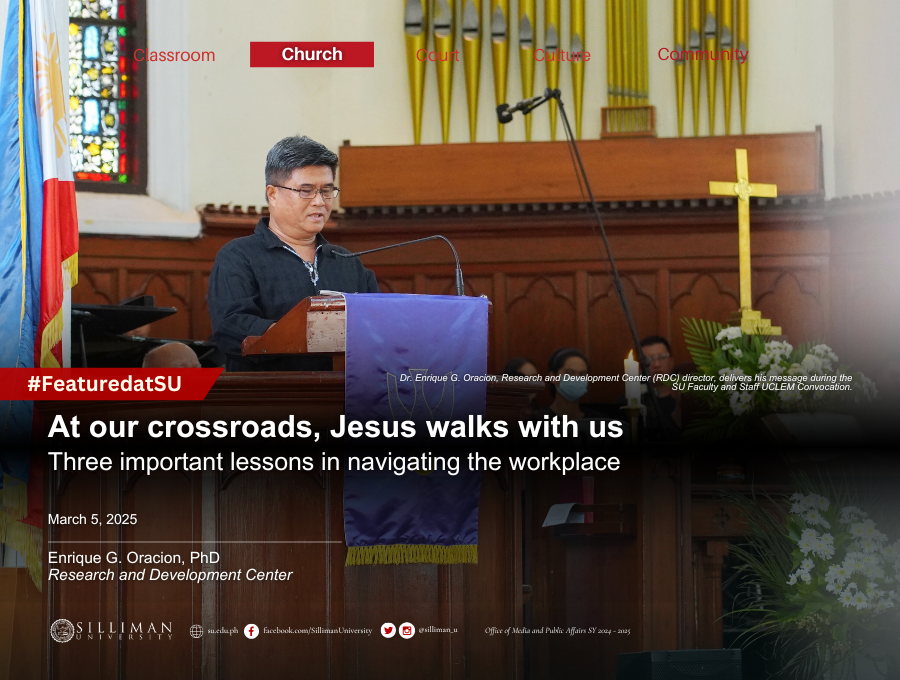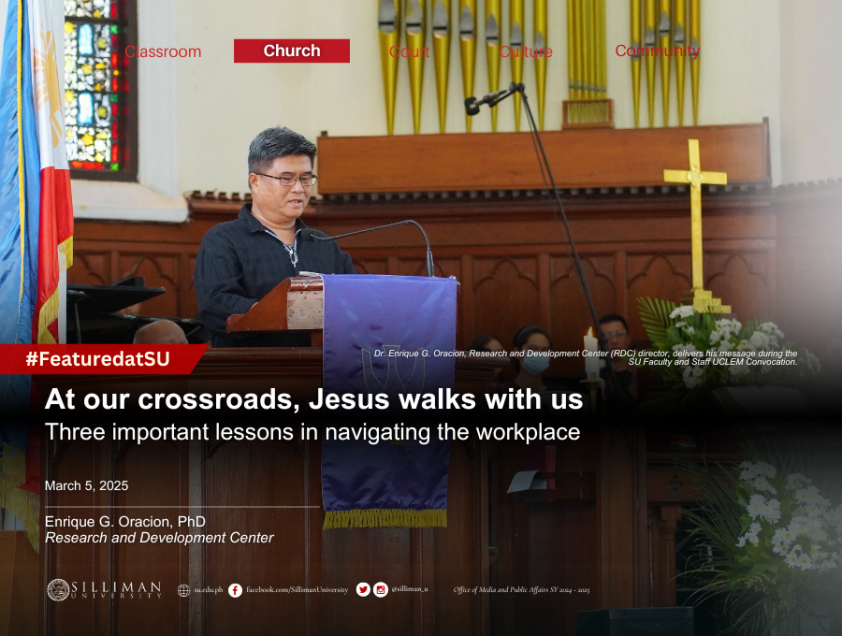
At our crossroads, Jesus walks with us
 Enrique G. Oracion, Ph.D.
Enrique G. Oracion, Ph.D.
Research and Development Center
When I was asked by a member of the University Christian Life Council to be the speaker for this convocation, I was initially hesitant but likewise excited because it’s an opportunity or a task not offered to all. Although I had done this before, it was among students. It is different with colleagues who know me. So, I asked myself: what meditation could I share with you that many could relate to and would appreciate reflecting on and be inspired by, given the circumstances now at the university, in the city, in the country, in the region, and in the world?
I was doubtful or apprehensive to proceed.
A few days later, I received the official invitation and found out that the UCLEM celebration, of which this convocation is a part, is anchored on the theme, “Jesus Walks With Us,” as inspired by Luke 24: 13-31. The theme sounds fitting to where I am now, for I am about to retire mandatorily due to age. I find myself at a crossroads, contemplating where I will go and what I will do next—if I choose to continue, and if I will still be valued or welcomed wherever I decide to stay or go. I need Jesus to walk with me when things are yet uncertain. Faith in God and faith in me are what I need at the crossroads of my life.
With those self-reflections, I now have a reference point where to start.
What I expressed earlier are also sentiments commonly heard from among those already fully retired—meaning, no longer employed. Also, these are shared by others whom some want to employ, as well as by retirees who remain eager and willing to work. Still, there is another type of retirees, but more of an exemption than the rule: those who confidently retire and enjoy life without complications. This kind of retirees must be happier.
For this, I have now established the issue to talk about.
I checked the gospel of St. Luke to frame my thoughts and to prepare my talk—it is about “the road to Emmaus,” which you have heard or read earlier. One of the several implications of this narrative for the faithful is “moving” for a purpose, which is fellowship with Jesus and others. This is evident in how other Bible commentators would refer to it as the “walk to Emmaus.”
Now, you must have already realized and understood why I started talking about crossroads in life. Symbolically, the context of the gospel could mean any “place” prepared by God for us to receive Him and our “actions” to go or leave this place. This is a post-resurrection narrative and conveys a lot of life lessons.
The road or walk metaphorically refers to our way of life, which includes what we believe in, our attitudes to life itself, what we desire to accomplish, what we do to achieve those aspirations, and what we failed to achieve when we were yet very able. The last speaks of older persons at their crossroads.
But this could also be true for those who are halfway to their destinations, yet feel something lacking, missing, or restraining them from achieving what is desired. It suggests an opportunity — one that calls for crossing the road or taking another route across the sea, where a door is opening.
Now, I have a framework.
Phenomenologically, the road of life is not equally experienced by all people because of variable circumstances, such that we do not also similarly appreciate and interpret Luke 24: 13-31. Dreaming is not restricted, and it could be anything. However, the opportunities to achieve the things desired and the means to get them may be outside the capabilities and capacities of some. Others are more endowed or equipped to get what they aspire to have quickly.
Some colleagues who joined Silliman University at the same time may not have stayed long or continued until their retirement unlike others. Some left earlier for further studies through external scholarships and never returned, or they joined other universities for a good income. A few had stopped teaching as a primary income source and went to non-academic fields, while some decided to retire at an early age based on the allowed number of years of service.
All have one aspiration—a beautiful life with the family they have. However, their life quality may differ because they vary in adapting or responding to life challenges and opportunities. Some doubt what lies ahead and choose not to explore or engage with it. They are stuck on the side of the road and never move.
Even members of the same family do not enjoy an all-paved road as they leave their families of orientation and live separately with their families of procreation. It may be easier for one or two siblings to build their families but difficult for the other siblings. Perhaps the latter siblings were not fully prepared for that crossroad when they moved out to build their own families. One needs a clear direction before setting out on a journey, as the path—whether smooth or rough—will ultimately be shaped by how one navigates it.
Indeed, life is not fair or easy for everyone, much like the journey of former Silliman working students from economically disadvantaged families who are now alumni. Perhaps not all were successful for some reason, but some were better off than others. And some of us here could relate well to or identify with this road we took during college to earn a degree.
Working inside or outside the University for the aspired degree, these students struggled hard to overcome the vicious cycle of poor class reproduction. They believed a rainbow awaited after the rain or storm. They could have decided to quit when they got tired and moved out from the University, but they persisted, believing in their capabilities and a reassuring God. All the pains turned into gains, just like when Jesus fulfilled what was prophesied about his resurrection.
Ironically, some students from economically advantaged families just took for granted the bounties afforded to them. They lost the family wealth as they failed to sustain what the generations before them had acquired and maintained. Most often, those in the third generation are stereotyped as a “lost species,” adrift on the highway of life when they fall short of parental and societal expectations. They have other priorities and ways of achieving them that are inconsistent with the previous generations. Changes are part of life, but some young people went astray and missed getting or enjoying what was promised to them as nurtured by their parents.
Now, at the crossroads of my advancing age, I learned some lessons from working in the academe, where I spent 40 years—within and outside Silliman University—33 years, to be exact with Silliman. Autoethnographically, these lessons are in the context of being a classroom teacher, researcher, and director when helplessness and hopelessness sometimes tempted me to quit and act on something for self-care. However, the passion to go on as a commitment to knowledge production and mentoring remains until the end of the road.
Here are three lessons that I want to share from personal experiences, observations, and what I heard, assuming that traveling the road is like navigating through the workplace:
First, working with someone offers opportunities.
Working alone or isolating ourselves and refusing mentorship offers restrains our capacity and ability to address our deficiencies and grow professionally. We need to get out of our comfort zones and learn from others who come our way and receive help at any time. It also becomes mutually beneficial when we reciprocate and ensure each group member is valued and supported. Extending a hand facilitates connectedness and nourishes more returns. This organizational value contributes to the success of a collective engagement and allows members to learn from each other because they have different interests and areas of expertise.
Second, someone working with us may also become a burden.
Ironically, working with others also becomes a burden when not all contribute to the preparations and arrangements for meeting a target. It is a resource loss when others are unmindful or careless about the other who sacrifices for the task and the group. In social psychology, we call them free riders because they do not invest much in the group’s effort while enjoying the same or greater benefits. This phenomenon is called social loafing, which promotes a culture of dependence and breeds mistrust, indifference, and pessimism. The values of team effort, hard work, and sharing eventually diminish, which we should revive as we cannot work alone.
Third, working in a large organization requires clear directions.
Information guides the means to accomplish assigned tasks when several workers are involved. False or withheld information and confusing instructions distract and delay actions or mislead decisions, thus missing an opportunity. At the crossroads of life, particularly during the most critical moments in the workplace, like resigning or moving to another job, taking a new work assignment, working with others in a new organization, and planning after compulsory retirement, demand balancing acts. All these moments require us to be sensitive to people and cautious of the information we receive and process because the consequences of our actions can make or unmake us or the other person.
Finally, this is my main message.
Hearing noises, sensing signals, listening to ideas, and verifying information are acts and traits we need so as not to miss opportunities and lose resources unavailable to everyone. Let us be critical in our thinking, guided by wisdom, and trust the Lord as we walk our road to Emmaus or whatever place Jesus has promised us.
So be it. Good afternoon.


